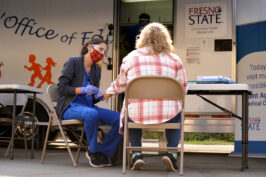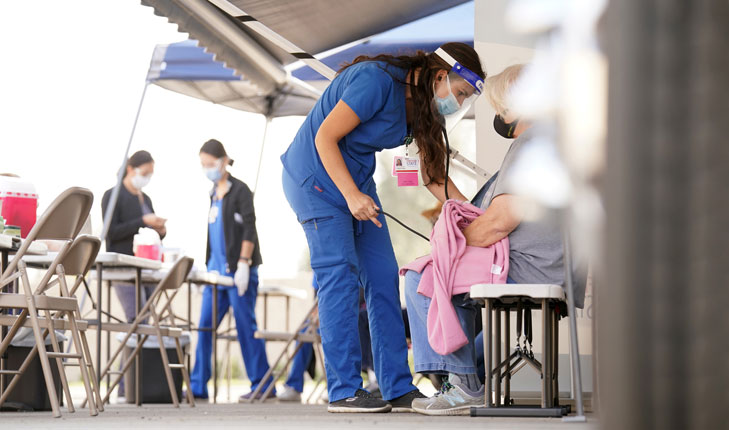The year was 2015 and the Fresno State mobile health unit was rolling into its very first location in Parlier, California – a small town southeast of Fresno with a population of just over 14,000. Parlier would be the first of hundreds of stops the mobile health unit would make in its first seven years, benefiting thousands of residents in rural and underserved communities along the way.
The mobile health unit’s humble beginnings is a story about more than just helping others – it’s about how a community came together for a greater purpose.
With $4 million in state funds secured by Assemblymember Joaquin Arambula, there will now be opportunities to grow the mobile health program even further. With the funding, the university will expand the mobile health unit program to include the purchase of two brand new, state-of-the-art mobile health units, bringing the future of health education at Fresno State to the forefront.
“I was proud to advocate at our state capitol and help secure $4 million in state funding for Fresno State’s mobile health unit,” Arambula said. “Through the mobile health units, future generations of students will be able to understand what our community needs, what some of our unincorporated areas are like and what some of our immigrant communities face. The poverty that we have right here in the San Joaquin Valley can only be experienced when you’re actually out in the community. I’m grateful that these investments will allow our students to understand the community that they will have the honor to serve.”
 For the past seven years, the School of Nursing at Fresno State, has been operating the mobile health unit out of an RV on loan by the Fresno County Office of Education Migrant Education Program. It currently houses two individual exam rooms, as well as storage space for medical equipment and other technology. Free health care screenings, diabetes and blood pressure checks and health education, as well as flu and COVID-19 vaccines are provided by the nursing students on hand, both inside and outside of the unit.
For the past seven years, the School of Nursing at Fresno State, has been operating the mobile health unit out of an RV on loan by the Fresno County Office of Education Migrant Education Program. It currently houses two individual exam rooms, as well as storage space for medical equipment and other technology. Free health care screenings, diabetes and blood pressure checks and health education, as well as flu and COVID-19 vaccines are provided by the nursing students on hand, both inside and outside of the unit.
To respond to the growing needs of the clinical program over the years, it was necessary to also expand the services and equipment needed to effectively serve the community, said Dr. Kathleen Rindahl, director of the mobile health unit program and associate professor in the School of Nursing.
With that in mind, the new mobile health units are expected to have enhanced features, including an interior space that can be modified to accommodate different program or clinical needs. Walls within the unit are designed to allow added space and can be folded to fit either one large exam room or two private exam rooms for mass vaccine clinics or health screenings. An added bonus – the new ADA-accessible mobile units will be entirely solar powered and also include a private restroom.
Since the start, the mobile health unit has been a program largely for and supported by communities within the Fresno County region. The mobile unit has visited a variety of sites around the region, from local parks and recreation areas, to nonprofits and community centers, to churches and schools. It is a true community effort, according to Rindahl. She said the impact on both the members of the community and the students gaining clinical experience has been immense.
“Our students are making a huge impact in our communities, but that’s not the best part about the mobile health unit program,” Rindahl said . “It’s the impact our communities are making on students. Anybody can read in a book about underserved populations or health disparities or limited access to rural areas. But our mobile health program gives our students firsthand experience on these health disparities within the Central Valley.”
To date, over 18,000 community members in over 270 unique sites around Fresno County have received free health care services, including those in rural areas where health care access is often limited.
Rindahl said the mobile health unit would not be possible without the partnerships formed between Fresno State and community organizations, health care systems, faith-based churches and local leaders.
This was never more apparent than in spring 2021. Although the COVID pandemic was still affecting a large part of the world, students and faculty were ready and willing to serve the local community. In partnership with Arambula, the Fresno County Department of Public Health, Saint Agnes Medical Center and local organization Cultiva la Salud, nursing students were able to administer over 8,000 COVID vaccines at pop-up vaccine clinics throughout the Valley.
“I was there on the frontlines rolling up my sleeves with many nursing students as we faced this pandemic together,” Arambula said. “From places like Del Rey and Laton, to Biola and Cantua Creek, where they don’t have access to health care services. I was so proud to work alongside the students as we administered thousands of vaccines.”
In addition to the purchase of the new mobile units, funds will also provide stipends for nursing students, who currently provide their own transportation to sites, sometimes traveling up to 70 miles round trip.
The launch of the new mobile health units will also impact the university in other ways.
“With Dr. Arambula’s support and his investment in Fresno State, we will take our mobile health program to the next level,” said Fresno State President Saúl Jiménez-Sandoval. “Additionally, and just as importantly, our College of Health and Human Services will be able to involve faculty and students from other disciplines in this important work, thereby creating inter-professional experiences, experiential opportunities and high-impact practices for a greater number of students and faculty.
With two mobile health units, we will be able to multiply the benefits of our community in very significant ways. Over 3,500 students have provided almost 20,000 hours of service-learning since 2015. Imagine what is going to happen in five years with two additional mobile health units.”
While nursing students represent a majority of the volunteers on the mobile health unit, students from other health and human service fields have also played a crucial role, including students majoring in social work, athletic training, physical therapy and public health among others. It is expected that this collaborative learning opportunity will expand across campus to educate more students from various disciplines beyond health and human services.
The two new mobile health units are anticipated to hit the road in January 2023. To stay connected on the latest dates, visit the mobile health unit website.





